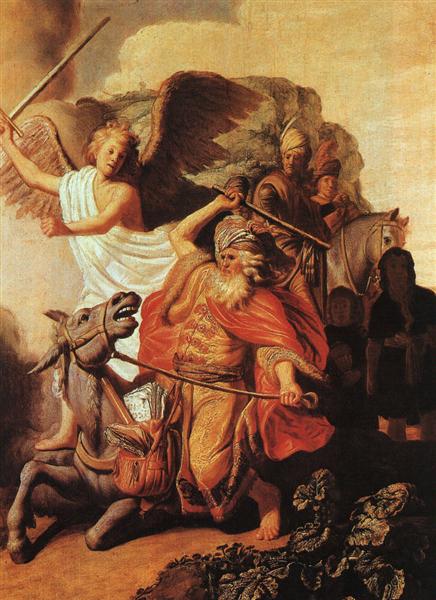Description
The painting "El Asno de Balaam" of Rembrandt, made in 1626, is a work that not only reflects the technical mastery of the Dutch artist, but also contains a rich narrative in biblical reference and in psychological interpretation. This painting is based on the story of the book of numbers in the Bible, where the prophet Balaam, despite being required by a king to curse the Israelites, is rebuked by his ass, who sees the angel of God along the way. This moment of revelation becomes the visual premise of the work, which connects the everyday with the divine.
In the composition, Rembrandt presents us with a dramatically illuminated scene, a fruitful feature in its style. The contrast between lights and shadows, in a masterful use of chiaroscuro, not only gives volume to the figures, but also focuses attention on the donkey and its almost human expression, revealing the surprise and fear he feels before the appearance of the angel . This game of lights creates an atmosphere of palpable tension, and the angel, with its ethereal glow, is barely insinuated in the background, which enhances the sensation of the supernatural that stalks the characters.
The colors chosen by Rembrandt are predominantly terrible, which suggests a connection with earthly reality and, at the same time, highlights the figure of the donkey and its owner. The palette consists of brown, ocher and subtle gray tones, which are interrupted only by the flashes of the light emanating from the angel, creating a powerful visual impact. This chromatic approach reinforces the duality between the mundane and the divine, inviting the viewer to reflect on the relationship between them.
Through the details in the painting, Rembrandt manages emotional connection between the two. This approach focused on the animal allows the narrative to reach an unexpected depth, since it is the ass who, with its inquisitive and almost challenging look, becomes the true protagonist of the scene. This use of a unique perspective is a distinctive feature of Rembrandt's work, which often focused on the expression and psychology of the characters, whether human or animals.
"Balaam's donkey" is eloquently inserted into the context of Baroque art, where the dramatization of light and shadow, along with a deep interest in emotions, prevails. The use of biblical narrative is not new in the work of Rembrandt, who frequently explored religious issues, always imbuing them with a human resonance.
This work not only reveals Rembrandt's technical ability, but also its ability to interpret and deepen human experience through art. Although "Balaam's donkey" can be less known than other of his masterpieces, it is a testimony of an artist's ingenuity in the exploration of the boundaries between the mundane and the spiritual, as well as the complexity of life itself, where Even an ass can serve as a bridge towards divine lighting. The painting invites the viewer to contemplate beyond the visible, revealing the multiple layers of meaning that Rembrandt constantly proposes.
KUADROS ©, a famous paint on your wall.
Hand-made oil painting reproductions, with the quality of professional artists and the distinctive seal of KUADROS ©.
Reproduction service paintings With a guarantee of satisfaction. If you are not completely satisfied with the replica of your painting, we refund your money 100%.

